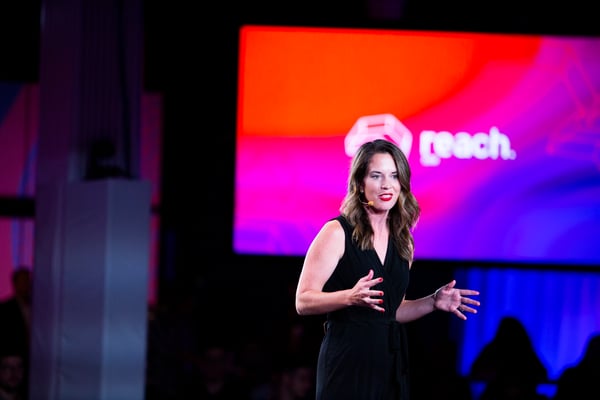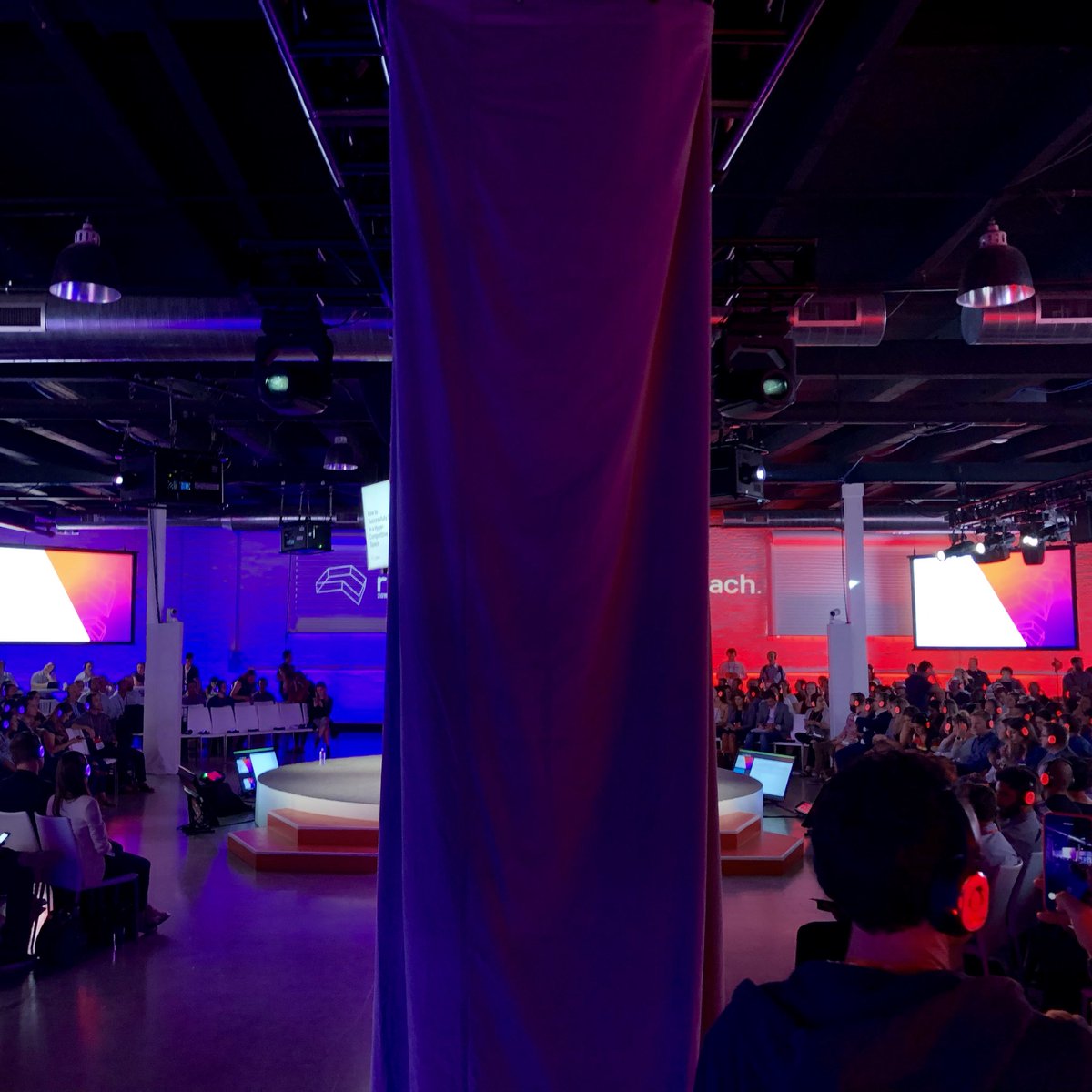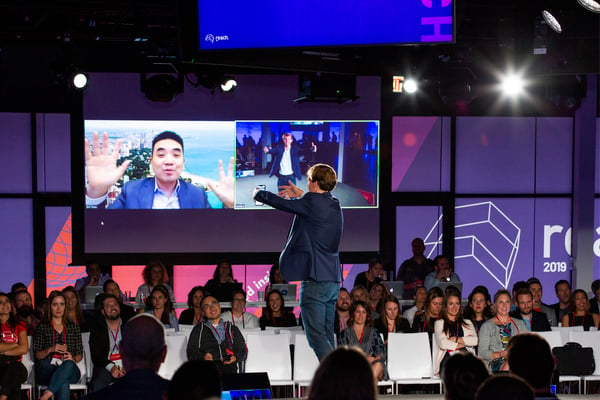I am not an event marketer by trade. But I guess I am now, in the way that someone becomes a marathon-runner immediately after they cross their first marathon finish line.
On September 11, 2019, my team and I executed G2’s first-ever conference, with the simple, singular goal of making it unlike any other conference that has existed.

Me speaking at Reach 2019
We are a talented bunch who, before now, lacked experience executing external events on this scale. This presented its challenges, while also playing to our advantage.
With no predetermined standards, it’s hard to say what you can’t do. Instead, we focused on what could be possible. We came up with fresh ideas and challenged ourselves to figure out how to make them a reality.
Key takeaways from Reach 2019
In this article, I’ll outline some of the difficulties we experienced while planning and executing Reach, as well as detail where we saw success.
The good news and what I hope to emphasize in all of this: we saw a lot more success than failure. With a talented team and a few strategic risks, we were able to provide just the day we had envisioned.
Top 3 lessons learned from Reach
Throughout planning and executing this event, we found ourselves taking notes on what to do differently next year. Not to say we did things poorly, but rather this was a learning experience on a grand scale. The following are the top three lessons I gleaned from planning this event.
1. Give yourself time
The more time to plan, the better. There's a lot that goes into event planning that I wasn't aware of before starting this. For example, what's the brand? How do we want to manage registration? Oh, by the way, you need a venue.
Between branding, logistics, promotion sponsors, speakers, internal enablement, there's a lot to get done. We opened up registration in mid-July for a September event, with the thought process of booking speakers before asking people to commit. Now that we’ve had a successful event, we feel more comfortable opening registration up sooner.
2. Have a clear message
Make sure your value prop is clear. We considered launching the event before our speakers were secured, but ultimately realized that our speakers are our value - especially when it comes to a first time event.
We delayed registration to make sure we had the best speakers lined up. This cut us short on time, but ensured we could point to what makes this conference worthwhile and different. For next year, we've built trust and will probably launch earlier. We also plan to open up a speaker request form so people outside of our inner circles can present themselves for consideration.
3. Utilize your entire company
Get employees involved early and often. Employees from your sales, marketing, product, etc are your best resources and advocates in an event like this. Our small team was heads-down planning for several months, but when we started sharing more (the good and the bad) with our company, that's when we started to get better ideas, more promotions, and ultimately improvements to the overall experience.
Where we reached success
If I may take a moment to toot my team’s horn, I am amazed at how well things came together day-of. We took a lot of risks in trying to plan an unorthodox experience for attendees and only saw rewards.
That’s the biggest advice I’d give to anyone trying to plan an event like this: don’t be afraid to take risks along the way. Here’s an overview of what I’d consider our riskiest moves:
1. Break-out sessions
Attempting break-out sessions while remaining in the same room. It was kind of like a silent disco: people would choose whether they wanted to attend the marketing or sales sessions and received corresponding headphones.

The speakers for those sessions were mic’d in a way that only their audience could hear their presentations. While this took a bit of getting used to, it ultimately went really well. Which is great, because it’s not like we had a separate room to use as a backup.
2. Experimented with digital
One of our sessions was digital, with our CEO Godard Abel having a conversation with Zoom founder Eric Yuan via, well, Zoom. Anyone who has executed a virtual meeting can attest to the complications.

G2 CEO Godard Abel speaking with Zoom founder Eric Yuan
Someone’s mic could be broken, or their internet connection isn’t strong enough for video. Thankfully, none of this happened, which was about 85 percent practice and preparation, and maybe 15 percent luck.
3. Ambitious registration goal
We committed to a goal of 500 guests, which is lofty for your first event. Many first-time events strive for 100 attendees or less. We had no equity with people because we’d never done this before, and had nothing to point to to show past successes.
Because we opened registration in July, we did a lot of last-minute pushes as the event got closer, running promotions for half-off registration and asking our G2 family to post on their LinkedIn pages. I’m happy to say that we achieved 600 registrations with 500 guests.
Hindsight for Reach 2020
In our advertising for this event, we told people honestly that we were trying to create an experience unlike any other. We had some nay-sayers in the beginning who would have us believe it was impossible, but reactions to the experience we created would say otherwise.
A huge motivator for us was creating an event where attendees weren’t being “sold” on anything. We didn’t use it as a day to push our product or company on attendees, and neither did our speakers. We wanted those who signed up to find value in the content being delivered, and I’d count that as our event’s greatest success.
Events are known for being a huge undertaking. Add on that this was our first attempt, we aimed for 500 guests, and we only began planning as far back as March and, well let’s just say I’m still trying to get my head to stop spinning.
What I want you to know, however, is that it’s absolutely possible. I had an amazing team that, after a lot of conversation, was able to whittle down what we wanted to provide our attendees: valuable content regarding what we know and can significantly impact, which is sales and marketing.
We worked collaboratively and weren’t afraid to try new things; things we had no idea would pass or fail. We hired amazing speakers whose overall platforms we admire, and kept our focus on what mattered most: the experience we were providing for people who trusted us enough to put their day in our hands.
Today? Well, today I’m taking a nap. But shortly after that, we’ll gear back up and get ready to do it all again, but bigger.
Interested in helping us reach new heights at Reach 2020? We're hiring! Check out the event planning opportunity on our careers page.

.png) by G2
by G2
 by Hailey Friedman
by Hailey Friedman
 by Mara Calvello
by Mara Calvello